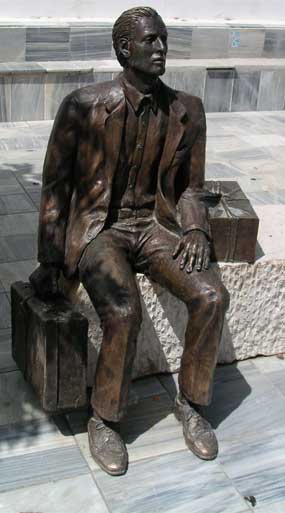"L'uomo che vive due volte" è un romanzo fanta-storico: la storia di un uomo che nasce nel 1870 (l'anno dell'unificazione finale dell'Italia con l'acquisizione di Roma) e delle sue avventure attraverso la storia italiana del XX secolo.
Nel romanzo, il protagonista ha un metabolismo rallentato e può godere di una lunghissima giovinezza.
Che ne dici? Ti piacerebbe vivere una vita lunga il doppio?
Scorri la pagina per proseguire l'attività... |
"L'uomo che vive due volte" (the man who lives twice) is a "history-fiction" novel: the story of a man born in 1870 (the year of the final unification of Italy with the acquisition of Rome) and his adventures through the Italian history of the 20th century.
In the novel, the main character has a slow metabolism, so he enjoys a very long youth.
How about that? Would you like to live a double-length life?
Scroll down for more of the activity... |
|---|

Cover of the book "L'uomo che vive due volte"
by Roberto Litta
Share this activity:
This video is additional reference material and is not property of CyberItalian.
Should you have any problem viewing it, please
notify us.
Thank you for your patience and collaboration!
Ascolta l'intervista con l'autore Roberto Litta, dove ti racconta di più della trama del romanzo.
Attenzione: alcuni parti del libro non sono appropriate per bambini, adolescenti o adulti sensibili. |
Listen to the interview with author Roberto Litta, where he tells you more about the plot of the novel.
Please note: some parts of the book are not appropriate for children, teenagers or sensitive adults. |
|---|
Il titolo del libro "L'uomo che vive due volte" è un po' strano. Generalmente questo tipo di titoli usano il passato remoto (visse) non il presente (vive). |
The title of the book "L'uomo che vive due volte" (the man who lives twice) is a little awkward. Usually, this kind of titles uses the "passato remoto" (visse) not the present (vive). |
|---|---|
Il "passato remoto" è usato raramente nella conversazione (a parte che per qualche regione). Esprime un'azione completata nel passato, che non ha più relazione con il presente: "Leonardo da Vinci nacque nel 1452". E' principalmente un tempo verbale usato nella lingua scritta per narrazioni storiche o letterarie. |
Il "passato remoto" (remote-past tense) is rarely used in conversation (except for some regions). It expresses an action completed in the past, that no longer has reference to the present: "Leonardo da Vinci nacque nel 1452" (Leonardo da Vinci was born in 1452). Mostly, it is a past tense widely used in writing for historical or literary narrations. |
Pratica il passato remoto con gli esercizi seguenti e clicca su Pinocchio-Risposte per vedere il risultato. |
Let's practice the passato remoto with the following exercises. Click on Pinocchio-Risposte to check the result. |
|---|
Trasforma i verbi in parentesi dall'infinito al passato remoto.
Usa il dizionario online se necessario.
- ____________ (io: cantARE)
- ____________ (tu: viaggiARE)
- ____________ (lui: dormIRE)
- ____________ (lei: tenERE)
- ____________ (noi: parlARE)
- ____________ (voi: mangiARE)
- ____________ (loro: piacERE)
- ____________ (io: leggERE)
- ____________ (tu: nuotARE)
- ____________ (lui: studiARE)
- ____________ (noi: andARE)
- ____________ (voi: venIRE)
- ____________ (loro: partIRE)
- ____________ (io: uscIRE)
- ____________ (tu: pagARE)
- ____________ (Lei: telefonARE)
- ____________ (noi: potERE)
- ____________ (voi: dovERE)
- ____________ (loro: volERE)
- ____________ (lei: conoscERE)
Coniuga i verbi in parentesi al passato remoto.
Usa il dizionario online se necessario.
- Io ____________ al ristorante. (from the infinitive: andARE)
- Lui ____________ in pubblico? (from the infinitive: parlARE)
- Lei ____________ molto. (from the infinitive: dormIRE)
- Tu ____________ molto? (from the infinitive: lavorARE)
- Lui ____________ la pizza. (from the infinitive: mangiARE)
- Voi ____________ coca cola!(from the infinitive: bERE)
- Noi ____________ molti libri. (from the infinitive: leggERE)
- Tu ____________ molti libri? (from the infinitive: comprARE)
- Tu ____________ l'estate scorsa? (from the infinitive: nuotARE)
- Loro ____________ al ristorante tutti i giorni. (from the infinitive: andARE)
- Lei ____________ al cinema. (from the infinitive: andARE)
- Lui ____________ l'ultimo film di Benigni. (from the infinitive: vedERE)
- Voi ____________ al cinema? (from the infinitive: venIRE)
- Tu ____________ tutte le sere. (from the infinitive: uscIRE)
- Lui ____________ in vacanza. (from the infinitive: partIRE)
- Anche loro ____________!(from the infinitive: uscIRE)
- Voi non ____________ uscire. (from the infinitive: potERE)
- Tu ____________ in montagna la scorsa estate. (from the infinitive: andARE)
- Lui ____________ un gelato? (from the infinitive: prendERE)
- Loro ____________ mangiare il gelato tutti i giorni. (from the infinitive: volERE)









